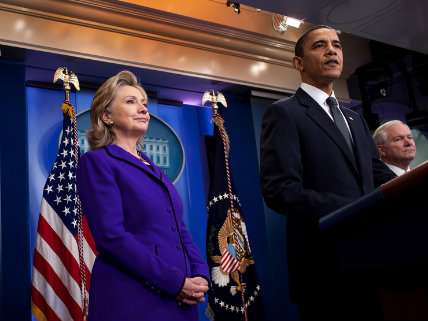Hillary Clinton Is Her Own Worst Enemy

Can Hillary Clinton be defeated? As she toured the country promoting her book last week during what was widely seen as a prelude to a presidential run, top Republican politicians and donors gathered in Utah to discuss the prospects for defeating the former Secretary of State and presumed Democratic nominee.
The answer is yes, perhaps, but at least in the short term, Republicans won't be the ones to undermine her chances. For the moment, Hillary Clinton's worst enemy is herself—with President Obama providing a bit of backup.
As in 2008, much of the case for Clinton relies on the expectation that her candidacy is inevitable, and once she's nominated she will be unbeatable. Since at least 2012, she's maintained strong favorability numbers—coming in as high as 70 percent favorable—and for much of this year, polls have shown her handily besting potential GOP nominees: A CNN poll in February found her leading New Jersey Gov. Chris Christie by 16 points. A Fox News poll in March found Clinton polling far better than Sen. Ted Cruz (R-Texas) and former Florida Gov. Jeb Bush in head to head contests. Multiple polls in April and May showed Clinton above 50 percent when compared against Rand Paul.
Those sorts of poll numbers constitute an impressive display of political force. Yet they already appear to be waning, making Clinton look less and less inevitable by the day.
As she has stepped out onto the national stage with her new book and numerous media events to accompany it, her numbers have dropped noticeably. Bloomberg, which put her at 70 percent favorability in December 2012, now finds her favorability at just 52 percent, down four points from March. A Gallup poll last week put her favorability at 54 percent, a five-point drop since February.
Meanwhile, potential challengers are gaining ground. Clinton still leads Christie, Paul, and Bush, but has dropped below the 50 percent mark on all of them, according to Bloomberg. She's weakest against Christie, despite the scandals that have plagued him throughout the year: In March she was leading him 52 to 39, but since then her edge has dwindled to 45-38.
Republicans are beginning to talk generally about how to beat Clinton, but mostly they're dealing with their own problems right now. The GOP isn't responsible for Clinton's dropping favorability—Clinton is.
Her dropping favorability numbers were the inevitable result of the transition to a more political, proto-campaign mode. To that end, she's lost ground with independents (who tend to view more politicized figures less positively), according to the most recent Gallup survey.
But to a degree, it may also reflect the way that the earliest presidential polls largely test name recognition. Clinton, as the former senator, secretary of state, and first lady, is far better known than any potential challenger. But while name recognition provides an early advantage, it's not a platform or an agenda or an idea. Clinton has none of those things yet. Her memoir, Hard Choices, was a lengthy but essentially news-free account of her time as Secretary of State, along with some additional backstory. In an interview with NPR, she struggled and grew testy when asked about the transformation of her position on gay marriage. In interviews throughout the week, she appeared not to want to talk about why she made the decisions she made, or what she supported going forward. She only wanted to talk about who she was.
The typical presidential pitch goes like this: "Hi, I'm [insert name], and I'd like to be president because [insert reason]." Right now, Clinton, presuming she runs, only has the first part of the equation: "Hi, I'm Hillary Clinton, and I'd like to be president."
She has plenty of time to say more, of course; she hasn't even announced her candidacy yet, although there can be little doubt that she is testing the waters. But constructing an agenda will be a difficult task for Clinton, who will inevitably feel the need to stick closely to the ideas, themes, and policies of the Obama era. The Democratic base won't let her stray too far, and since she won't be able to run on innovation, she'll run on continuation instead—with, perhaps, a somewhat more hawkish foreign policy posture.
But the Obama presidency has limited appeal beyond the base. The president's approval rating is just 44 percent, roughly where it was around the 2010 midterm when Republicans took control of the House, and it's not likely to get better this year.
This, in short, is Clinton's problem: Her inevitability is predicated on her name recognition and popularity. But she's lost popularity as she's become more political, and she has little room to propose a vision or agenda that would break free of today's politics. So she's setting up a campaign in which she runs on her name and experience alone—but the political Clinton without an agenda is no match for the statesperson whose popularity soared.
She's running against herself. And right now, it looks more than a little like she's losing.


Show Comments (263)